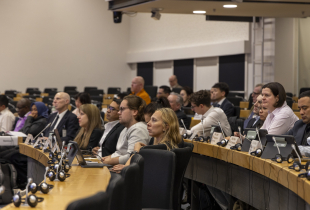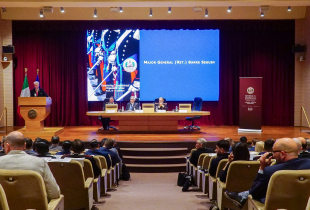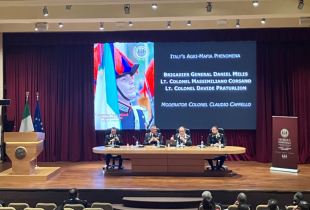
Marshall Center Participants Hear about Human Trafficking from Perspectives of Victims
By Christine June
Public Affairs Office
George C. Marshall European Center for Security Studies
GARMISCH-PARTENKIRCHEN, Germany (April 14, 2015) – Dr. Silvia Scarpa, adjunct professor at the Libera Università Internazionale degli Studi Sociali Guido Carli (known by the acronym LUISS) and John Cabot University, presented “Human Trafficking from the Perspective of Victims” April 14 during the Countering Narcotics and Illicit Trafficking resident program at the George C. Marshall European Center for Security Studies here.
In her presentation, she also discussed the change in the approach of human trafficking, assistance to victims of human trafficking, victims whose status is irregular in host countries, no punishment of victims for their involvement in unlawful activities and the issue of the demand for human trafficking.
Scarpa teaches Public International Law at LUISS University. She also teaches courses in the fields of contemporary slavery and human trafficking, human rights, international organizations, international law and international migration at John Cabot University of Rome and on international migration and multiculturalism at the American University of Rome.
She holds a Ph.D cum laude in Political Science with a specialization in International Human Rights Law awarded by the Scuola Superiore Sant’Anna of Pisa (2006), a Master’s Degree in International Protection of Human Rights awarded by the University “La Sapienza” of Rome (2002) and a Degree cum laude in Political Science – International Affairs awarded by the University LUISS Guido Carli of Rome (2002).
Marshall Center’s CNIT is a two-and-a-half week resident program that focuses on 21st century national security threats as a result of illicit trafficking and other criminal activities. It ends April 24.
Course design includes guest lecturers from national and international law enforcement and security organizations, course seminar activities discussing the range of government countermeasures to combat criminal activity, and strategy development exercises that focus on best practices and international approaches to combating these growing threats against national security.
This year’s CNIT participants hail from: Afghanistan; Albania; Algeria; Argentina; Armenia; Australia; Azerbaijan; Bahamas; Belize; Bosnia and Herzegovina; Bulgaria; Colombia; Czech Republic; Dominican Republic; Egypt; El Salvador; Fiji Islands; Georgia; Greece; Guatemala; Hungary; India; Indonesia; Japan; Jordan; Kazakhstan; Kenya; Kosovo; Malaysia; Maldives; Mauritania; Mexico; Moldova; Mongolia; Montenegro; Morocco; New Zealand; Nigeria; Oman; Peru; Philippines; Romania; Serbia; Slovenia; South Africa: Tanzania; Thailand; Turkey; Ukraine, United States; and, Uzbekistan.
This year’s CNIT course has a good mixture of participants who work at defense, interior and justice ministries, and law enforcement and other government agencies.
The course is designed for government officials and practitioners who are engaged in policy development, law enforcement, intelligence, and interdiction activities aimed at countering illicit narcotics trafficking, terrorist involvement in criminal activity, and the associated elements of transnational crime and corruption. It examines the major methods by which transnational criminal and terrorist organizations engage in illegal narcotics trafficking and other criminal activities for profit.
The mission of the Marshall Center, as a vital instrument of German-American cooperation, is to create a more stable security environment by advancing democratic institutions and relationships; promoting active, peaceful, whole-of-government approaches to address transnational and regional security challenges; and creating and enhancing enduring partnerships worldwide.
The Marshall Center offers eight resident programs that examine complex transnational, regional and international security issues: Program on Terrorism and Security Studies; Program on Applied Security Studies; Program on Security Sector Capacity Building; Seminar on Regional Security; Seminar on Transnational Civil Security; CNIT; Program on Cyber Security Studies; and, Senior Executive Seminar.


